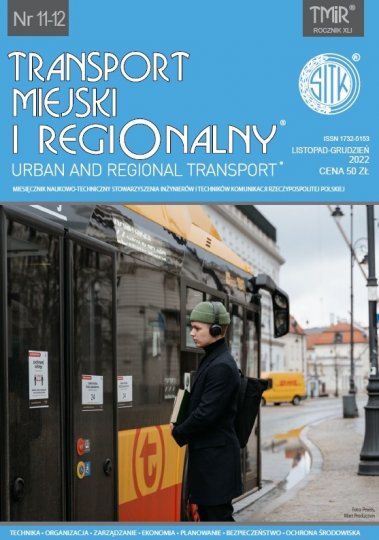
Katarzyna Mieszczak
Creating spatial development depending on the accessibility to public transport stops, on the example of the area of Górka Narodowa Zachód
Abstract: The article deals with the subject of spatial development planning, taking into account the accessibility of a given area to public transport stops. The presented example concerns the area of Górka Narodowa Zachód.
This area has been modeled on the basis of isochrones of access to stops and the idea of a 15-minute city. The conceptual stage was carried out using numerous analyzes concerning, among others, the current development and transport system. In the further part of the article, the accessibility understood as the frequency of the lines and the isochrones of access to the stops were analyzed. Next, planning documents were presented, on the basis of which the spatial development concept was created. The new project is fundamentally supported by the accessibility of the planned development to the stops, both the existing ones and those planned in the near future.
Keywords: transport accessibility, spatial development, 15-minute city, isochrones of access to stops
Kamil Dubiel
Analysis of the results of the research on the assessment and expectations of passengers of municipal passenger transport in Wieliczka
Abstarct: The article introduces the subject of collective transport in the Wieliczka Commune. A survey was conducted among the passengers of Wielicka Spółka Transportowa (WST) regarding the assessment and expectations regarding the functioning of public transport. At the beginning of the article, the Wieliczka Commune and the transport system management system were briefly characterized. Then, the collective transport operator in the commune, i.e. Wielicka Spółka Transportowa, was described. Each of the supported bus lines is shown. In the next part of the article, the results of the research, which were described and interpreted, are graphically presented. Conclusions were drawn up in the final part of the article.
Keywords: communal transport, public transport, passenger ratings, passenger expectations
Wojciech Bąkowski
Conditions for effective implementation of modern urban transport
Abstract: The aim of the article is to present, based on the achievements of the theory of management and resource economics, and the processes that may affect the implementation of modern solutions in urban investments and the transport system for city residents. The effectiveness and speed of changes in public transport depends on the knowledge resources possessed by the city authorities, the local government and the organizer, the availability of financial resources for expenses related to the development of modern transport, resources in the transport infrastructure and rolling stock, and the IT technology used. The potential of these resources and the processes that take place in the decision-making system and financial flows determine the ability of the municipal government to carry out the tasks that should be implemented so that “better transport results in a better city”. The innovative approach and flexibility of the management process by the organizer depends on the organizational and legal form. The article presents three organizational and legal forms that occur in Polish practice. Their characteristics and the scope of freedom in using the resources at their disposal were discussed in order to draw the attention of politicians and local authorities to the need to improve the organizational and legal form of the organizer before undertaking the planned system changes in urban transport. Attention was drawn to the importance of appropriate intellectual capital, the core of which is knowledge. In the summary, a thesis was put forward that in the national public transport one of the important postulates faced by people managing the municipal administration is the need for postgraduate education offering the latest knowledge in the field of designing and implementing innovations in urban transport.
Keywords: urban transport, knowledge resources, financial resources, material resources,
Aleksandra Ciastoń-Ciulkin, Klaudia Wojtas
The passenger information system in Vienna and its evaluation by passengers
Abstract. Passenger information is an important component of the quality of services provided and influences the decision on the choice of a specific means of transport. Timeliness, reliability and accuracy of passenger information at every stage of the journey will contribute to the increase in the competitiveness of public collective transport in relation to individual transport. Passenger information is all the more important because obtaining it is important at a stage much earlier than the implementation of a transport service, it even determines the decision to purchase a transport service. The article presents the passenger information system used in urban public transport in Vienna, presenting the tools and forms used for its transmission. The assessment of the functioning of the passenger information system made by users of public collective transport in Vienna was also presented. The assessment of the passenger information system was carried out for various tools used at the trip planning stage, at stops and in vehicles.
Keywords: urban transport, passenger information, pre-travel information, travel information, public transport
Jakub Starczewski
Distribution of loads by cargo bikes in cities
Abstract: The article presents systematized knowledge in the field of bicycle logistics. The characteristics of bicycle systems are presented, the main features of bicycle distribution systems are described, based on both theoretical assumptions and the analysis of examples of functioning implementations. Selected examples of load distribution systems with cargo bicycles in Europe are also discussed. In the final part of the article, short suggestions regarding the possibility of using bicycles in the transport process were presented.
Keywords: cargo bike, cargo bike, bicycle logistics, last mile problem, cargo distribution
Translated by Google












